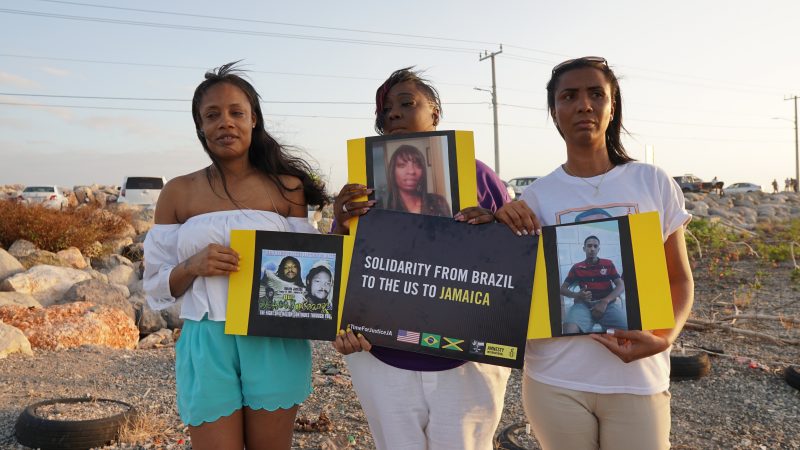A Journey for Justice in the Americas: Three Women Tell Their Stories in Kingston, Jamaica (Part 1)
Three women from three very different countries met recently in Kingston, Jamaica. Under normal circumstances, their paths may never have crossed, but these inspiring activists have one thing in common: each of them lost a relative at the hands of the police.
As part of their effort to draw attention to the issue of police brutality, Shackelia Jackson from Jamaican, Ana Paula Oliveira from Brazil, and Katrina Johnson from the United States, recently accompanied an Amnesty International delegation to Jamaica.
Their visit coincided with the International Day Against Police Brutality on March 15. The women took part in a public conversation at the University of the West Indies Mona campus entitled “A Journey for Justice in the Americas,” hosted by Amnesty International Caribbean/Caribe/Caraibes and supported by local human rights lobby group Jamaicans for Justice.
They used the occasion to deliver 64,331 letters and signatures as part of a global petition which, since December 2017, has gathered more than half a million supporters worldwide who are calling on the Jamaican government to end impunity for unlawful killings by police.
Generated through Amnesty International’s Write for Rights campaign, the petition includes thousands of messages of solidarity with Jamaican human rights defender Shackelia Jackson, whose 29-year-old brother Nakiea was shot dead by police in downtown Kingston on January 20, 2014.
In 2016, Amnesty International released Waiting in Vain: Unlawful Police Killings and Relatives’ Long Struggle for Justice, a report detailing illegal tactics used by police across Jamaica to make it difficult for victims’ relatives to get justice.
But such tactics have not stopped Jackson from trying. She openly expressed her disappointment at the low turnout for the event, which was live-streamed on Facebook, but the reality is that many Jamaicans are ambivalent about extrajudicial killings. Instead, their focus is on the country's rising homicide rate (over 1,600 murders in 2017) and growing concern about personal security.
In fact, it is common for Jamaicans to openly (or tacitly) support “hard policing” methods. There was recently some measure of public support for Reneto Adams — a “tough” retired policeman who was allegedly involved in extrajudicial killings during his time as head of the controversial Crime Prevention Unit — to be appointed to the post of police commissioner.
Adams was involved in operations in the inner city community of Tivoli Gardens in 2001 which resulted in many deaths. The subsequent 2010 incursion by security forces in the same community, in which 72 people are alleged to have died, continues to reverberate. Prime Minister Andrew Holness eventually apologised in Parliament for the incident last December — a year after the publication of an Amnesty special report on the relatives’ long struggle for justice after extrajudicial killings.
According to a report by the Independent Commission of Investigations (INDECOM), which probes abuse by the police, after a downturn in police-related deaths between 2014 and 2016, 2017 saw an alarming increase of 51%. Thus far, 2018 has seen 31 fatal shootings by the police and INDECOM itself is now in a state of uncertainty after a March 16 Appeal Court ruling held that an organisation is not a legal person and therefore cannot arrest, charge or prosecute.
Hi! I am a robot. I just upvoted you! I found similar content that readers might be interested in:
https://globalvoices.org/2018/03/28/a-journey-for-justice-in-the-americas-three-women-tell-their-stories-in-kingston-jamaica-part-1/